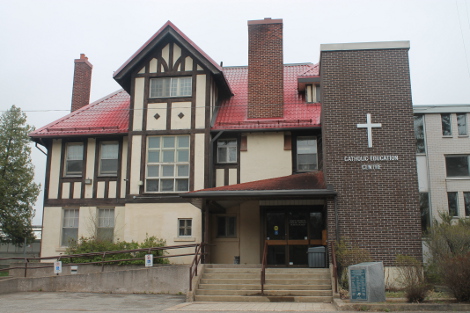A proposed resolution regarding the Ontario Ministry of Education's controversial Health and Physical Education curriculum did not even reach the discussion stage at Wednesday's Huron-Superior Catholic District School Board meeting.
The proposed resolution, moved by HSCDSB trustee Kathleen Rosilius, called for the board to delay implementation of the new curriculum in its classrooms for one year (until September 2016) in order to give parents and ratepayers, trustees, board officials and teachers more time to voice their opinions of the sex education component of the curriculum.
No other trustee came forward as a seconder to the proposed resolution, therefore it did not come up for discussion at the meeting.
The province has directed school boards to begin teaching the new curriculum in September 2015.
"This whole community of Sault Ste. Marie is having discussions right now about the whole issue of transparency and openness."
"I have found when people find what's buried in the details of this curriculum, they're alarmed," Murphy said.
"Public boards have a duty to be transparent, open and discuss issues in the public eye so that the public can be informed, and last night we did not even get a seconder for a motion that was more than reasonable."
Opposition to the sex ed program for many is based, in part, on religious beliefs.
"There are so many points of Catholic teaching that this (curriculum) violates that the motion was more than reasonable in light of that," Murphy said.
"There is a tendency to go with the path of least resistance, and the path of least resistance in this case is to go along with what the Ministry wants."
Apart from faith-based reasons, opponents of the program say the explicit and non-traditional topics covered in the sex ed program are simply not appropriate for young children in elementary schools.
They also say the province, in the wording of the curriculum guidelines, has left parents almost completely out of the sex ed process, moving them to the bottom of the list of people children are advised to consult if they have questions about sex.
The guidelines urge children to ask questions of a 'trusted peer or adult', a healthcare professional, community elder, teacher, religious leader or a 'reputable website.'
"At the very beginning (of the guidelines) they (the Ministry) state parents are first educators (about sex ed), but they give it lip service because in every example that follows, and I've counted, they ignore parents as resources," Murphy said.
"When they do mention parents, they are seventh or eighth down the list."
Announced by Premier Kathleen Wynne’s government February 23, the sex education portion of the new Health and Physical Education curriculum has raised some eyebrows across the province.
To be taught at public and Catholic schools from Grades 1 to 12 beginning September 2015, the curriculum includes a new emphasis on the concept of sexual consent (the age of sexual consent in Ontario is 16).
Children in Grade 1 will begin learning the names of body parts such as penis and vagina.
Discussion of “gender expression” and masturbation will be introduced in Grade 6.
Students in Grade 7 will learn about anal and oral sex and prevention of sexually transmitted diseases (STDs).
The dangers of “sexting” and the exchange of explicit photos and information online, will be discussed in Grade 7 as well.
In Grade 8, students will learn about “gender identity, sexual orientation and self-concept,” and also taught to make decisions pertaining to sexual activity and contraception.
Supporters of the curriculum say it is necessary for these topics to be taught, in a changing world, in a responsible way by educators instead of children being exposed to a wide variety of sexual information through unreliable, potentially dangerous sources such as, for example, social media.
On Monday, a petition (contained in several binders) signed by 185,000 people from a number of faiths and cultures, represented by the Canadian Families Alliance (CFA), was taken to Queen's Park.
The petition urges the provincial government to repeal the sex ed curriculum and start over with parental consultation.
John Stadnyk, HSCDSB director of education, did not discuss the resolution after Wednesday's meeting, but in an earlier conversation with SooToday, said the curriculum would be taught "with the proper lens and perspective, addressed in terms of Catholic education.”
Algoma District School Board (ADSB) officials, at a board meeting in February, said there will be an opportunity for parents to opt out, that is, pull their children out of the sex education component of the curriculum.
